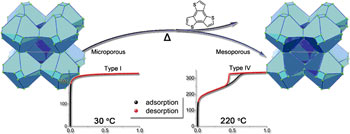US chemists have made a metal-organic framework (MOF) that changes from microporous to mesoporous when heated up. This makes it better at accommodating large guest molecules, potentially improving its ability to store and separate gases.
Hong-Cai Zhou, at Texas A&M University, and colleagues propose that the change in porosity is due to partial decarboxylation of the MOF’s ligands.
For more details, read their Chemical Science Edge article.
You can find out more about MOFs in Metal Organic Frameworks, a Chem Soc Rev themed issue, or see Seth Cohen’s Chemical Science Mini review, Modifying MOFS: new chemistry, new materials.
And if you have some ‘hot’ science to report, submit your research to Chemical Science.











